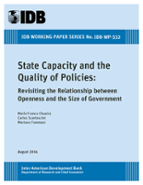State Capacity and the Quality of Policies: Revisiting the Relationship between Openness and the Size of Government
Date
Aug 2014
Journal version
Summary
The literature has identified that countries with higher levels of openness tend to present a larger government sector as a way to reduce the risks to the economy that openness entails. This paper argues that there are a number of policies that can mitigate trade-induced risks, many of which do not have the necessary implication of increasing public spending. Yet, many such policies require governmental capabilities not available to any country. For that reason, the relationship between openness and the size of government might be mediated by the quality of its public sector. While countries with weak government capabilities will tend to rely on spending expansions to deal with trade-induced volatility, countries with stronger governmental capabilities might address such challenges by more efficient and less costly means. The empirical analysis in this paper shows that the effect of openness on government consumption is mediated by the quality of government institutions.




